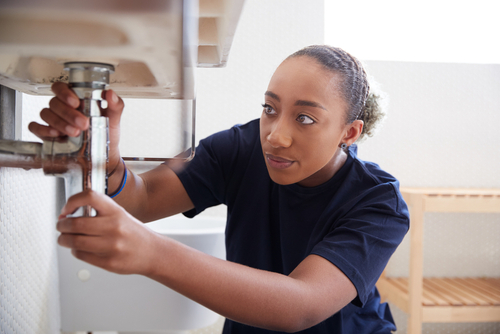
Ideally, you want your water heater to last for many years, especially if you purchase a modern unit that promises longevity. Hoping for an extended time with your water heater doesn’t mean that it will happen. The truth is that not everything is built to last, and with use over a period of time, wear and tear sets in, and inevitably, your water heater will start having issues. Some you may be able to repair, but significant problems could mean the death of your water heater. Check out these common water heater problems and how to fix them.
Lack of Hot Water
Not getting any hot water can result from several possible issues, and how you fix them will depend on whether your heater is electric or gas-powered.
- The most common reason for not hot water is an electric heater may not be receiving any power, which is needed for it to function. If you circuit breaker has been tripped, just turn it off and turn it back on again. If your fuse is blown, a replacement is needed.
- Check the high-temperature cut-off. Open the panel and press the red “reset” button. Check to see if hot water is flowing.
- A faulty heating element(s) could also be the source of your hot water issue. Test each of these elements and make the replacement as required.
- If your heater is gas-powered, the gas valve may be open. Check if this is the case, and if not the issue, check the burner or the pilot.
If you fail to identify the source of the problem, get professional help.
Limited Hot Water Or Water Not Hot Enough
Depending on your type of heater, the cause of any of these problems could be different.
- A simple reason could be that your heater tank is not large enough to support your heating requirements. For instance, with a heater tank that’s too small, the hot water may run out before everyone in your large household gets to shower in the mornings. You need a water heater that matches your needs.
- Another cause of limited hot water could be a heating element failing, which you should check and replace if it’s the source of the problem.
- Your thermostat may not be at a high enough setting to sufficiently hot your water, and in this case, simply adjust to a higher setting.
Get professional help if you can’t find the source of the problem.
Water is Too Hot
A thermostat that is set at a temperature that is too high can leave you with scalding water. To resolve the issue, adjust to a lower setting on the thermostat. If this fails, a faulty temperature pressure valve could be the issue, where the heater fails to shut off when it reaches the correct temperature. Get a replacement valve immediately because this is a dangerous situation.
Water Takes Forever To Heat
If your water takes far too long to heat, you could be looking at faulty heating elements, sediment build-up on the heating elements, or a defective thermostat. Check these individually and replace them as required. If it’s a gas heater, the problem could be the burner, which you should check and take the necessary measure to restore proper functioning.
Water Pressure Low
Not being equipped with broad enough pipes could be the reason for your low water pressure. Many older homes are outfitted with ½” pipes, while modern homes typically have ¾” pipes installed. If the issue isn’t the pipes, it could rest with the boiler, which you should have checked out by a professional.
Leak From Tank or Connections
Loose connections could be at fault if you experience leaks related to your water heater. Simply tightening the connections with the use of a wrench is the fix. If faulty valves are to blame, replace them to resolve the issue. A leak directly from the water heater tank creates a serious situation and could signify tank corrosion. A corroded tank is a dangerous unit and should be replaced.
For a resolution to your water heater problems, ASAP Drain Guys & Plumbing’s team of skilled professionals will put your worries at ease with quality service. We are thorough with our assessment and present the best solution for your particular water heater problem. Don’t hesitate to call us.

